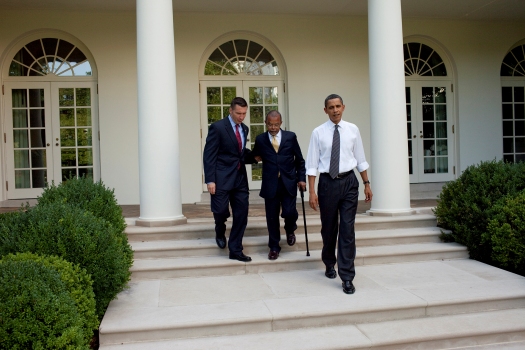The big hoopla on the blogs this week has been whether Joe Wilson’s exclamation “you lie!” amongst the healthcare debate, was racist. Jimmy Carter and many on the left say yes, while the GOP power structure categorically denies any possibility that the exclamation was based on race. From there, the discussion of race spiraled out of control, leading to questions about whether George W. Bush was being racist when he called Obama “this cat” last year during the campaign. Rush Limbaugh joined the discussion by highlighting a fight between a white kid and a black kid on a school bus. To Limbaugh’s horror, the black kid won. “In Obama’s America the white kids now get beat up with the black kids cheering ‘yeah, right on, right on, right on,'” he said.
There’s no doubt in my mind that Limbaugh’s statement was racist. As Adam Serwer writes, Limbaugh “perceives an explicit reversal of the way things are supposed to be. In Limbaugh’s America, the black kids know their place, and that place isn’t in the White House.” And Matt Yglesias notes that the predictable result of these discussions is that members of the GOP consistently minimize the importance of racism toward Barack Obama while over-dramatizing a perceived reverse racism or political correctness toward whites.
But when it comes to race, both the left and right too often misrepresent the issue.
If you define a racist as someone who feels animosity toward someone of another race, then most political and media confrontations aren’t racist (Limbaugh and Beck aside). More often, we see politicians being racial, acting or speaking with the clear awareness of race. Though outdated and perhaps ignorant, Bush calling Obama “this cat,” is not racist. It’s racial. Similarly, pointing out the problematic racial views of some white commentators is not racist or reverse racist. It’s racial.
The Joe Wilson case is different. Calling out “You Lie!” is not, on first glance, racial or racist. Wilson actually thought Obama was lying. But the question is whether some members of the GOP harbor a more subtle racism in trying to put Obama in his place. Last week, for example, Sen. Saxby Chambliss (R-GA) said that President Obama, the most powerful man in the world, should show some “humility” while delivering a speech on health care reform to congress. And during the campaign, many red state voters couldn’t quite put their finger on why they didn’t like Obama. There was just something about him. Last August, former Reagan and Clinton staffer David Gergen said that the McCain campaign deliberately pushed the message that “he’s uppity, he ought to stay in his place.”
Ta-Nehisi Coates writes that blaming resistance to Obama on racism oversimplifies the issue.
If we concede, as most reasonable people do, that racism is a factor—not the factor but a factor—in resistance to Obama, then in fact, what we’ve seen this year is, by the very nature of an Obama presidency, unprecedented. Put simply, we’ve seen the crazy-tax, of which race is a portion, before. But we’ve never seen the crazy-tax intensified by race. We have not seen it accompanied by watermelon jokes, by Congressmen referring to him as boy, by clucking heads claiming that the president “has exposed himself as someone with a deep-seated hated of white people.” We’ve never seen the whitey tape, before.
There’s a tendency to lump anti-black racism in with all the serious problems presented when you try to make a democracy work. There is always a danger of becoming single-minded, of bringing to bear a myopic analysis which sees one thing in everything. Moreover, watermelon jokes are a long way from red-lining, and in seeing how far we’ve come, the temptation is to dismiss how far we have to go.But from a black perspective, it’s a temptation you can ill-afford. Racism cost us dollars a half-century ago. Today it costs us quarters—but it still costs.
That racism still plagues all levels of our society should not be overlooked. And I hope that liberals continue to hold our leaders accountable for perpetuating racial and social imbalances. But the cacophony of this week’s discussion on race moves us further from the post-racial era promised by the Obama campaign. And paying attention to the subtleties between racist and racial could help clarify the discourse.













